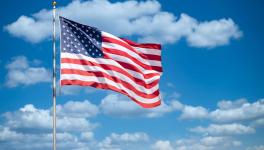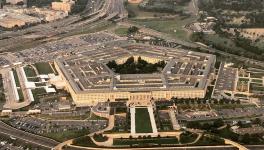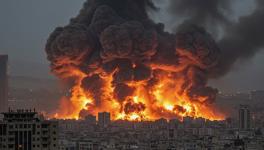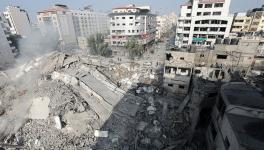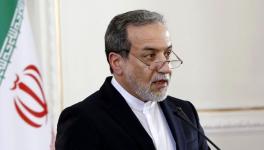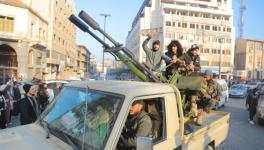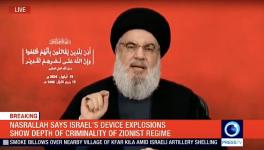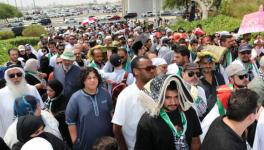Let Iran Choose its Next President
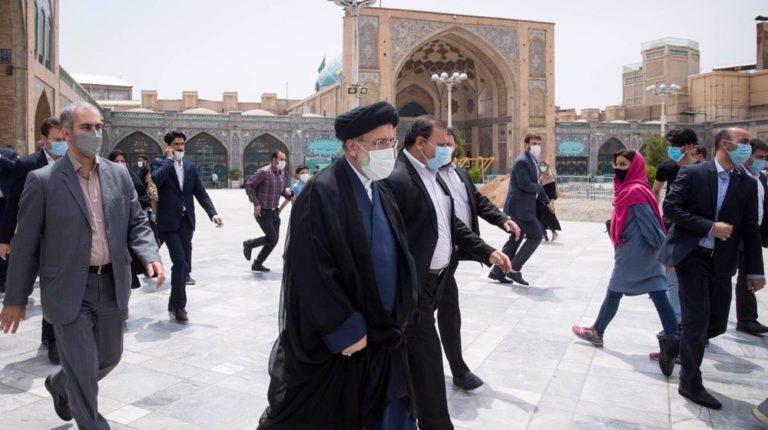
Iran’s presidential candidate Seyyed Ebrahim Raeisi began his election campaign with two events: a meeting with businessmen and a visit to Tehran Grand Bazar, May 26, 2021
The western analysts feel agitated about Iran’s refusal to play by the rule book of liberal democracy. They feel indignant even as Tehran released on Tuesday the final list of candidates found qualified by the Constitutional Council to run for president in the June 18 election.
A consensus is forming that the election is gerrymandered by the powers that be. In reality, they are applying western norms of democracy, although the 1979 Iranian revolution created a unique political system in Iran devolving upon the unassailable supremacy of the concept of velayit-e-faqih, (guardianship of the jurists in power) but renewable through free elections on the basis of universal suffrage.
Such a political system based on Islamic principles with popular support was conceived as the best means to preserve the revolutionary ideals and ensure stability as well as create a firewall against predatory strikes by inimical foreign powers. Iran’s modern history is replete with brazen foreign interventions and it is no secret that the Iranian revolution is today at a crossroads.
A transition is looming large for the position of the Supreme Leader, which Ali Khamenei has been occupying since 1989 at the age of 50. The position carries immense responsibilities as the spiritual head of the system as well as being the most powerful political authority with either direct or indirect control over the executive, legislative and judicial branches of government, as well as the military and media.
Interestingly, Khamenei had served as the third President of Iran from 1981 to 1989 before being elected as the Supreme Leader by the Assembly of Experts.
With the lifting of the US sanctions, which is in the cards, Iran’s integration into the world economy is expected to enter a new phase, and foreign influences and pressure on the country’s decision making are bound to intensify as never before. Iran is a potentially very rich country in resources and there is going to be a scramble for its minerals, in particular.
There is a wonderful 2006 book Overthrow authored by veteran New York Times foreign correspondent and author Stephen Kinzer about the US’ involvement in the overthrow of foreign governments from the late 19th century to the present.
Kinzer contends that “establishing military bases around the world and bringing foreign governments under American control were never ends in themselves” but were “ways for the United States to assure itself access to the markets, resources and investment potential of distant lands.” He adds to it as a supplementary factor that US intervention came also from humanitarian hubris as well — “the power of the noble idea of American exceptionalism.”
Both greed and hubris are present in the US’ fraught relationship with Iran, which will remain in adversarial terms for a foreseeable future even if diplomatic ties are established. The US fancies that there is a huge pro-American sentiment in Iran and it is far from a situation of every Iranian being militantly anti-Israel, anti-American, or in favour of the system of velayit-e-faqih.
Again, there is a notion that Iran’s support the resistance movement is in reality skin deep only and people don’t want to see the country’s resources being squandered to support militant groups such as Hezbollah or Hamas at a time when the economy ought to be the priority.
These self-serving notions, with no empirical data to back up, have led to the USG appropriating $75 million to go to the promotion of democracy and a more “open” society in Iran.
Kinzer writes in his book, “The United States uses a variety of means to persuade other countries to do its bidding… By the end of the twentieth century, it had become more difficult for Americans to stage coups because foreign leaders had learned how to resist them. Coups had also become unnecessary.”
When it comes to Iran, the system is based on checks and balances that prevents concentration of political power. But dispersal of power also has a flip side — it can not only create a dysfunctional system but is also vulnerable to foreign penetration.
It is critically important that the three main pillars of the political system — the presidency, the Majlis and the judiciary — are broadly in harmony with each other despite whatever differences on specific issues. Factionalism has been the Achilles heel of Shia politics historically.
All these considerations prevail when the list of approved presidential candidates is announced. The Guardian Council, which vets candidates for the presidential election, is appointed by the Supreme Leader and is a constitutionally mandated 12-member body of six Islamic jurists (faqihs, or, experts in Islamic Law) and six jurists specialising in different areas of law, to be elected by the Majlis from among the Muslim jurists nominated by the Chief Justice. In principle, the Supreme Leader can demand a revision of the recommended panel of presidential candidates and once, in the presidential election in 2005, it did happen.
Now, this may not conform to the practice of democracy in America. But then, as in America, it is any country’s choice in terms of its history and culture and exigencies of politics to adopt the most suitable electoral system. When it comes to this year’s election, the so-called reformist wing could not agree on a consensus figure while the conservative faction (Principalists) has several candidates in the fray.
Chief justice Seyyed Ebrahim Raeisi, who is being mentioned as front runner, and apparently enjoys broad support in the conservative camp, had opposed the candidacy of incumbent president Hassan Rouhani in the last election in 2017 but polled only 15.8 million votes as against the latter’s 23 million votes. Clearly, being the favourite of the conservative faction alone does not necessarily assure election victory. Surprises are galore when the voters make their choice.
There are other formidable candidates in the fray beyond Raeisi — notably, Mohsen Rezai, former IRGC commander; Saeed Jalili, Iran’s chief nuclear negotiator from 2007-2013 (presently a member of the a Expediency Council which arbitrates between parliament and the Guardian Council in any dispute); Abdolnasser Hemmati, the central bank governor (a “moderate” technocrat) who has worked under two presidents from the opposing wings of Iran’s political factions. By the way, all three candidates are PhD holders.
All in all, from the western perspective, the real problem with the current election in Iran is that the outlook for a moderate candidate is bleak. And this has profound implications at a juncture when the sanctions are likely to be lifted on Iran and the country will be embarking on a new journey to realise its full potential for growth and development for the first time after the Islamic Revolution in 1979.
A joint survey of the Iranian public conducted by the Chicago Council on Global Affairs and IranPoll in April provides fascinating insights into how Iranians view this pivotal moment for their country. The US think tank estimated that “Iranians view Rouhani’s policies quite negatively, especially his economic policies… As the election nears, nearly two-thirds of Iranians say they would prefer a critic of Rouhani to be the next president of Iran.”
That is to say, if no credible reformist candidate has not appeared in the electoral arena, it is not because any superior power ordained so but simply because the reformist platform stands discredited today in the eyes of the electorate.
The top contenders in the electorate arena are mostly conservative candidates. Raeisi scored 27%, but then, a plurality of Iranians also say they are undecided (35%). The undecided portion may swing the election in either direction. Clearly, no decisive favourite has volunteered in the upcoming election.
Interestingly, while half of Iranians think it is likely that sanctions would be loosened during the Biden presidency, there is little expectation of improvement for the US-Iran relations over the next four to eight years.
The crux of the matter is that elections in Iran are never about foreign policy. Iran has a very animated political culture. Both in its symbolism and its pragmatism, it stood out that Presidential candidate Raeisi began his election campaign on Wednesday with two events: a meeting with businessmen and a visit to Tehran Grand Bazar.
The election will not produce the results that the western world would hope for. The compass for Iran’s foreign policy is not going to be reset. It is anchored on strategic autonomy. Therein probably lies the West’s disappointment.
Get the latest reports & analysis with people's perspective on Protests, movements & deep analytical videos, discussions of the current affairs in your Telegram app. Subscribe to NewsClick's Telegram channel & get Real-Time updates on stories, as they get published on our website.









